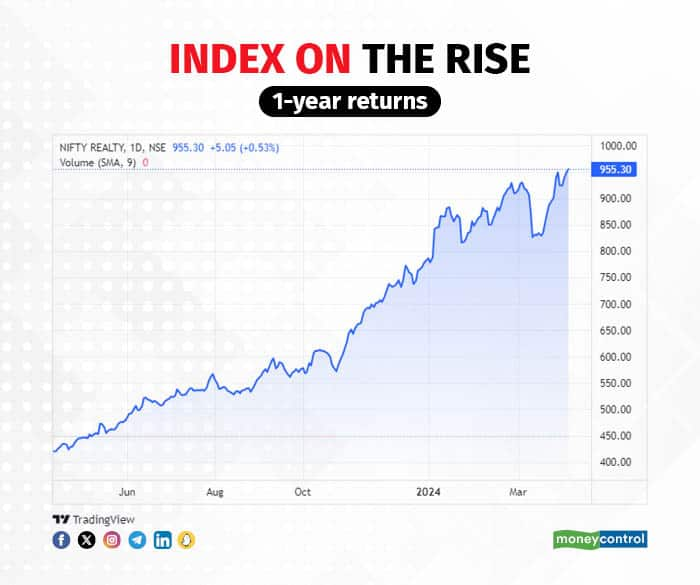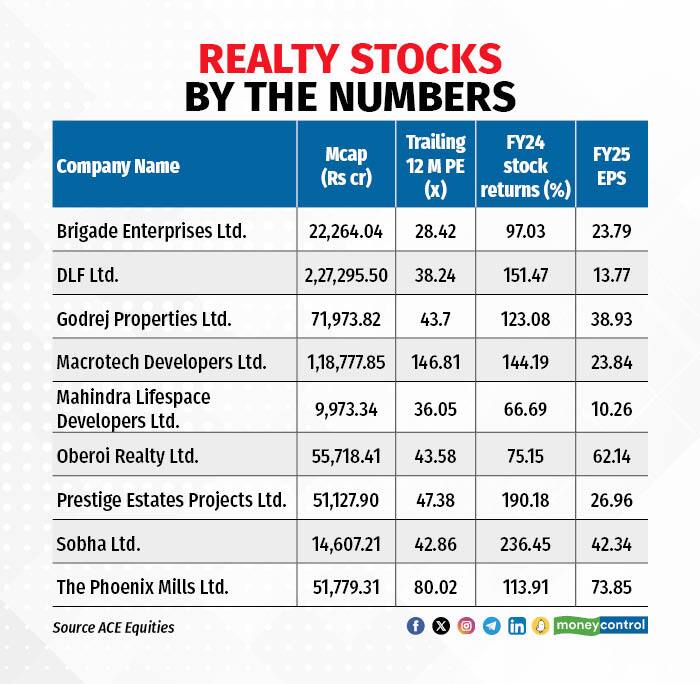



On April 2, HDFC Asset Management Company, announced that it would be discontinuing fresh subscriptions and capped systematic investment plan (SIP) flows into its realty index fund.
The HDFC Nifty Realty Index Fund, which opened its new fund offering or NFO on March 7 and closed on March 21, is the first ever mutual fund scheme to focus on the realty sector.

While the company has not stated a reason for this, Moneycontrol had reported that, according to market experts, the high valuations and rally in real estate stocks could be the underlying cause. Moneycontrol has reached out to HDFC AMCto get their perspective and will update the copy once they respond.
Also read: HDFC Nifty Realty Index Fund stops lumpsum investments, restricts SIPs days after launch
Will overvaluation dampen enthusiasm for the sector?Over the last couple of quarters, realty stocks and the seen smart growth. The Nifty Realty Index touched 959.10 points on April 2, led by a bullish outlook for the segment. The last time the index neared this level was in May 2008.
Individual stocks have also seen rapid gains on the back of fresh buying of land parcels and new joint ventures being formed. The sector also got a boost when it was the Reserve Bank of India at its recent monetary policy committee meeting decided to keep interest rates unchanged.
All this has translated into a good run for realty stocks. Godrej Properties has gained over 116.8 percent (price/earnings multiple of 111.79) over the last one year; while Brigade Enterprises has gained around 96 percent (PE of 70.62).
But this in turn has raised questions about valuation, with the PE expanding rapidly over the last one year. Currently, the Nifty Realty PE ratio is around 62.3 times against 38.2 times in April 2023. Returns over the last one year have been around 125 percent.
In a January 20 report, CLSA analysts had expressed concerns that a lot of the growth potential had already been factored into valuations. While they were positive that the segment would see growth, the report added that property stocks had gone up sharply over the past three months, and as per their reverse DCF or discounted cash flow valuation, very high growth was already built into current prices, which they believe will be difficult to achieve considering the cyclicality of the sector.

However, not all see this as a problem. According to Karan Khanna, lead analyst, small- and mid-caps, hotels and property, Ambit Capital, only a handful of sectors, including real estate, will experience significant growth of 15-20 percent over the next few years. "Unlike past cycles, where developers primarily used their operating cash flows for land acquisition and project funding, the current cycle shows developers maintaining control over leverage and adjusting pricing according to demand trends. This suggests that future earnings potential for real estate developers looks promising and robust, which is likely to be reflected in their valuations,” he said.
A similar view was expressed by analysts at Nuvama in their March 2024 report. According to the brokerage, even as many real estate stocks are now trading at a premium to their net asset value, valuations are in line with the previous upcycle. "We argue that value exists on a relative basis given the strong cash flows, all-time low leverage, industry consolidation, and market share gains, and expect buoyancy in housing sales to sustain and stay positive on property stocks from a medium-term perspective," the report said. "Additionally, a potential interest rate cut in CY24E can be a stock catalyst, in our view," it added.
Also read: Boom in luxury keeps real estate stocks on top. Can the rally sustain?
Rupesh Sankhe, senior analyst, utilities, renewables, capital goods and real estate at Elara Capital, said that while commercial real estate may be softer, the residential segment is flourishing, so investors shouldn't worry about high valuations. "Given the stronger balance sheets and the fact that we're only in the third year of a real estate cycle that typically spans 6–10 years, current valuations appear justified. Furthermore, indicators show that the market is swiftly absorbing new launches, adding to our confidence in its resilience," he said.
From recovery to outperformanceThe sector, experts say, had not been doing well for over a decade before showing signs of recovery in 2020, owing to the cyclical nature of the sector. Saurabh Rathi, managing director and co-head, Motilal Oswal Real Estate, said that recent trends show high demand and limited supply, leading to the lowest inventory overhang in years. In CY23., sales were about 5.3 lakh units, the highest in the last 10–12 years. Supply for the same period was only 4.5 lakh units. "If you would look at data across 2012 to 2021, generally, the supply would have outstripped demand by a significant margin. But because for the last two and a half years demand has been beating supply, today we are standing at an inventory overhang of about 11 months only," he explained. " In my 16–18 year career in real estate, this is the lowest that I've ever seen at a country level. At times, some cities have done well, and they have had a lower inventory overhang. But at an India-level or country-level, 11 months is unheard of. So this is very positive."
For the first time, he added, demand and supply are also backed by a steady increase in price. "Historically, if you look back at 2012, which was probably a very overheated environment, prices weren't stable. This time around, over the last two years, on average over two years, we have seen a price rise of 15 percent (about 7-8 percent annualised)., which is very, very balanced when such kind of demand comes in. That's a very reasonable price increase," he said. This demand is expected to hold for quite some time because while cities like Mumbai and Pune have already seen peak demand and absorption, other markets like Bengaluru, Chennai and the Delhi-NCR area are yet to go back to their peak cycles, providing more scope for growth.
OpportunitiesMost analysts are placing their bets on large real estate developers. Sankhe is positive because these developers are well-prepared with strong projects and solid balance sheets, boasting an equity ratio of just 0.3 times. This, he said, leaves them plenty of room to expand, and they are doing so by actively signing memoranda of understanding, acquiring land and partnering with smaller developers.
"Despite recent stock price increases, today's valuations are underpinned by stronger fundamentals compared to previous real estate booms. Additionally, pent-up demand from the 2014-2020 slowdown is driving growth in the residential sector," Sankhe pointed out.
Among the large developers on analysts' lists are DLF, Sobha, Lodha, Brigade, Phoenix Mills and Sunteck. While brokerages like Nuvama have a buy call on Godrej Properties, analysts at Ambit have a sell call on the stock due to its "unfavourable" valuations.
RisksFor most analysts tracking the sector, the challenges are currently minimal. While there may be some slowdown in buying and construction during the upcoming election season, demand could pick up as soon as customers have clarity on the results, job creation and earning capacity. According to Khanna, in the long run, execution could be the sole stumbling block. "The only challenge is continuing with the execution track record over the next two or three years because skilled labor availability will be a challenge, that's one. Second, there could be a slowdown during the election period," he added.
Disclaimer: The views and investment tips expressed by investment experts on Moneycontrol.com are their own and not those of the website or its management. Moneycontrol.com advises users to check with certified experts before taking any investment decisions.Discover the latest Business News, Sensex, and Nifty updates. Obtain Personal Finance insights, tax queries, and expert opinions on Moneycontrol or download the Moneycontrol App to stay updated!
Find the best of Al News in one place, specially curated for you every weekend.
Stay on top of the latest tech trends and biggest startup news.